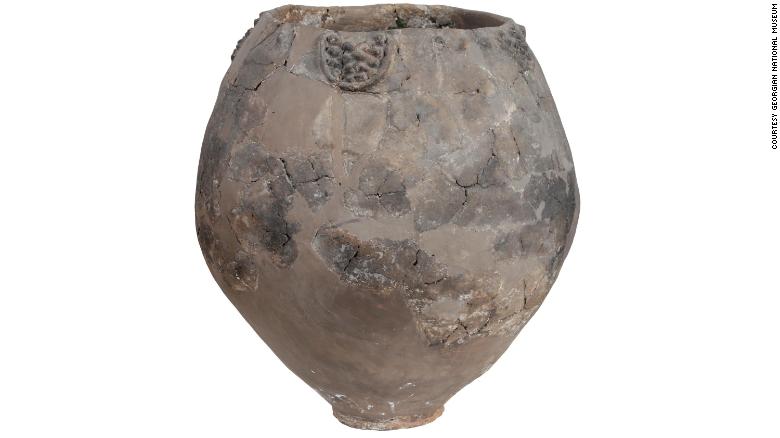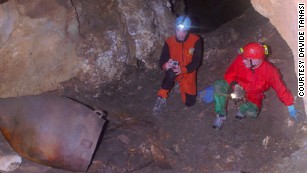Earliest winemaking traced back 8,000 years to Georgia

A neolithic jar from Khramis Didi-Gora, Georgia.
Story highlights
- Neolithic pottery shards were found to contain grape wine residue
- Expert: "The human relationship with wine has a truly deep history"
The earliest evidence of winemaking has been traced back 8,000 years to Georgia by an international team of scientists.
Neolithic
pottery shards were found to contain grape wine residue from 6000-5800
B.C., almost 1,000 years earlier than previously thought.
"As
a Georgian, we always believed that wine came from Georgia, but now we
have scientific evidence from natural science and archaeology to prove
it," said David Lordkipanidze, director of the Georgian National Museum
and co-author of the study published Monday in the Proceedings of the National Academy of Sciences.
The new discovery reinforces the established and well preserved culture of wine in the country.
"We
have an uninterrupted history of wine in Georgia -- the jars found in
the Neolithic period are similar to the vessels we still use today,"
said Lordkipanidze.
The
team analyzed 18 shards from pottery jars uncovered in recent years
from multiple sites across Georgia, as well as samples from a 1960
excavation.
The shards
tested positive for tartaric acid, which gives wine its tart flavor, and
were dated to the early Neolithic period, 6000-5000 B.C. They also
contained samples of grape pollen.
"This
early Neolithic date is quite surprising. The Caucasus has been
proposed as a key area for domestication by Soviet archaeologists
already ... there have been claims that grains were actually
domesticated for beer making, but nobody yet guessed at the high
antiquity of wine," added Ulrike Sommer, senior lecturer at the UCL
Institute of Archaeology, who was not involved in the new study.
The research team believes the jars were most likely used for all three stages of winemaking -- fermentation, aging and serving.
The three-year research project was funded by the National Wine Agency of Georgia.
"This
study proves that the human relationship with wine has a truly deep
history, rivaling our long-term experimentation with beer," said Augusta
McMahon, an archaeologist at the University of Cambridge who was not
involved in the new study.
Viniculture,
the practice of making wine, was a crucial step in the process of human
evolution, inextricably linked to the development of agriculture. The
earliest samples illustrate human ingenuity in developing methods to
press and preserve extracts, the study states.
Earlier this year, in August, researchers found traces
of 6,000-year-old wine on ancient pottery recovered from a Sicilian
cave, rewriting the history of wine-making on the Italian peninsula.
The
cave was used from prehistory to Classical times as a site for
religious rituals, with the wine possibly offered to underground
deities, said Davide Tanasi of the University of South Florida, who led
that research.
Prior
to this, the earliest evidence for grape wine in the Near East (Western
Asia and the Middle East) was found in Iran, near the Zagros Mountains,
dating to 5400-5000 B.C.
But the new findings push the date of origin back further.
Wine,
as a drink, has historically played a dominant role in culture -- first
as medicine, then in rituals and traditions, now consumed as a much-loved indulgence.
"This will surely resonate with anyone who now makes wine in their shed or brews beer in their garage," said McMahon.


Comments
Post a Comment
comments below